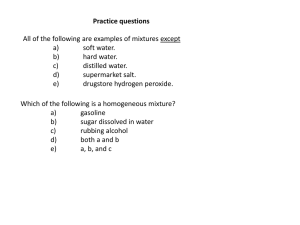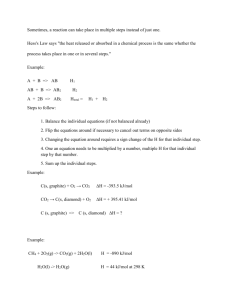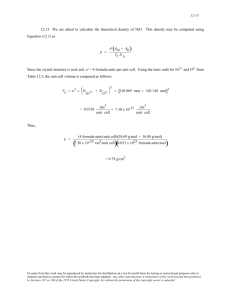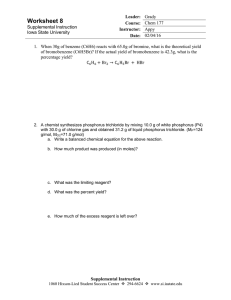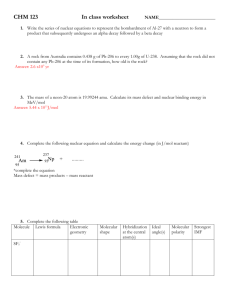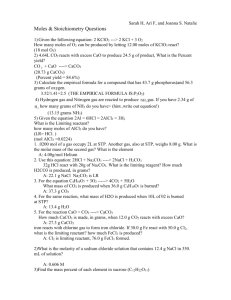Chemical Quantities
advertisement
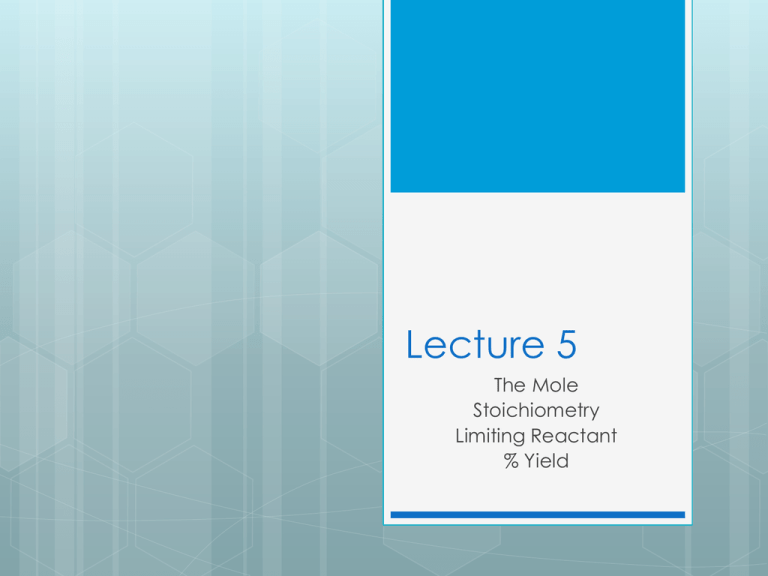
Lecture 5 The Mole Stoichiometry Limiting Reactant % Yield Avogadro’s Number 6.022 x 1023 mol-1 The Mole 1 mol Ne atoms = 6.022 x 1023 Ne atoms = 20.18 g 1 mol Cl- ions = 6.022 x 1023 Cl- ions = 35.45 g The mole is the fundamental unit for counting particles on a microscopic level. It allows us to draw quantitative connections between macroscopic and atomic level chemical processes. Molar Mass of CO2 Molecular Weight = 12.01 amu + 2(16.00 amu) = 44.01 amu/CO2 molecule = 44.01 g/mol CO2 1 mol of CO2 molecules = 6.022 x 1023 CO2 molecules =44.01 g Ex) Converting Grams to Moles Ex) How many moles of NaCl are there in 48 g of NaCl? 48 g NaCl x 1 mol 58.44 g = 0.82 mol NaCl Ex) Converting Grams to Moles Ex) How many grams of C2H6 are there in 18.7 moles of C2H6? 18.7 mol x 30.08 g 1 mol = 562 g Ex) Converting from Grams to Molecules Ex) How many water molecules are contained within a 56 g pure sample of water? 56 g x 18.02 g 1 mol x 6.022x1023 molecules 1 mol = 1.9 x 1024 molecules of H2O Ex) Converting from Grams to Atoms Ex) How many hydrogen atoms are contained within a 56 g pure sample of water? 56 g x 1 mol 18.02 g x 6.022x1023 molecules 1 mol x 2 = 3.74 x 1024 H atoms Conservation of Atoms in Chemical Reactions O H H C H 1 1 O H O O 2 O O C O H H H H CH4 + 2O2 CO2 + 2H2O 2 O Conservation of Atoms in Chemical Reactions O H H C 1 O H H O O 2 O C: 12.01 amu = 12.01 amu H: 4(1.01) amu = 4.04 amu O: 4(16.00) amu = 64.00 amu 80.05 amu O C O H H H 2 O H C: 12.01 amu = 12.01 amu H: 4(1.01) amu = 4.04 amu O: 4(16.00) amu = 64.00 amu 80.05 amu Ex1) Predicting Mass of Products Ex) What mass of water is produced when a car burns 246.4 g of methane? CH4 + 2O2 CO2 + 2H2O mol CH x 2 mol H O x 18.02 g H O = 553.7 g H O 246.4 g x 116.05 2 1 mol CH 1 mol H O g CH 4 2 4 2 4 2 Ex2) Predicting Mass of Products How many grams of CO2 and Fe are produced when 114 g of carbon monoxide gas is added to a vessel containing excess hot iron (III) oxide Step 1. Write a balanced chemical equation 3CO + Fe2O3 3CO2 + 2Fe Step 2. Find masses of CO2 and Fe CO2: 114 g x 1 mol CO 28.01 g CO x 3 mol CO2 3 mol CO 1 mol CO x 2 mol Fe x Fe: 114 g x 28.01 g CO 3 mol CO g CO x 44.01 1 mol CO2 = 179.12 g CO2 55.85 g Fe 1 mol Fe 2 = 151.5 g Fe Ex3) Predicting Mass of Reactants What mass of sodium bicarbonate is needed to produce 32 g of Na2CO3? 2NaHCO3(s) Na2CO3(s) + H2O(g) + CO2(g) 32 g Na2CO3 x 1 mol Na2CO3 105.99 g x 2 mol NaHCO3 1 mol Na2CO3 x 84.01 g 1 mol NaHCO3 = 51 g NaHCO3 Limiting Reactant If you have set quantities of two different reactants, one will get used up and some amount of the other will be left over. Limiting Reactant: The reactant that is used up limits how far the reaction will proceed. Excess Reactant: The reactant that is leftover when the reaction is complete. Ex) Limiting Reactant Problem Ex) (a) What is the limiting reactant when 28 g of glucose reacts with 14 g of oxygen gas? (b) What mass of CO2 is produced? Step 1. Write a balanced chemical equation C6H12O6 + 6O2 6CO2 + 6H2O Ex) Limiting Reactant Problem (cont.) Step 2. Find the mass of CO2 that would be produced by each reactant 28 g C6H12O6 x 1 mol C6H12O6 180.18 g C6H12O6 x 6 mol CO2 1 mol C6H12O6 x 44.01 g CO2 1 mol CO2 = 41 g CO2 Ex) Limiting Reactant Problem (cont.) Step 2. Find the mass of CO2 that would be produced by each reactant 14 g O2 x 1 mol O2 32 g O2 x 6 mol CO2 6 mol O2 x 44.01 g CO2 1 mol CO2 = 19 g CO2 Ex) Limiting Reactant Problem (cont.) Step 3. Compare the two masses produced. The reactant that produced the smallest quantity of product is the limiting reactant. 19 g < 41 g Thus O2 is the limiting reactant (limits the amount of product formed) 19 g of CO2 would be produced in theory Ex) Percent Yield Ex) Find the percent yield if only 15 grams of CO2 were produced in the previous problem. Actual Yield % Yield = x 100 Theoretical Yield Ex) Percent Yield Find the percent yield if only 15 grams of CO2 were produced in the previous problem. 15g 19g x 100 = 79%
